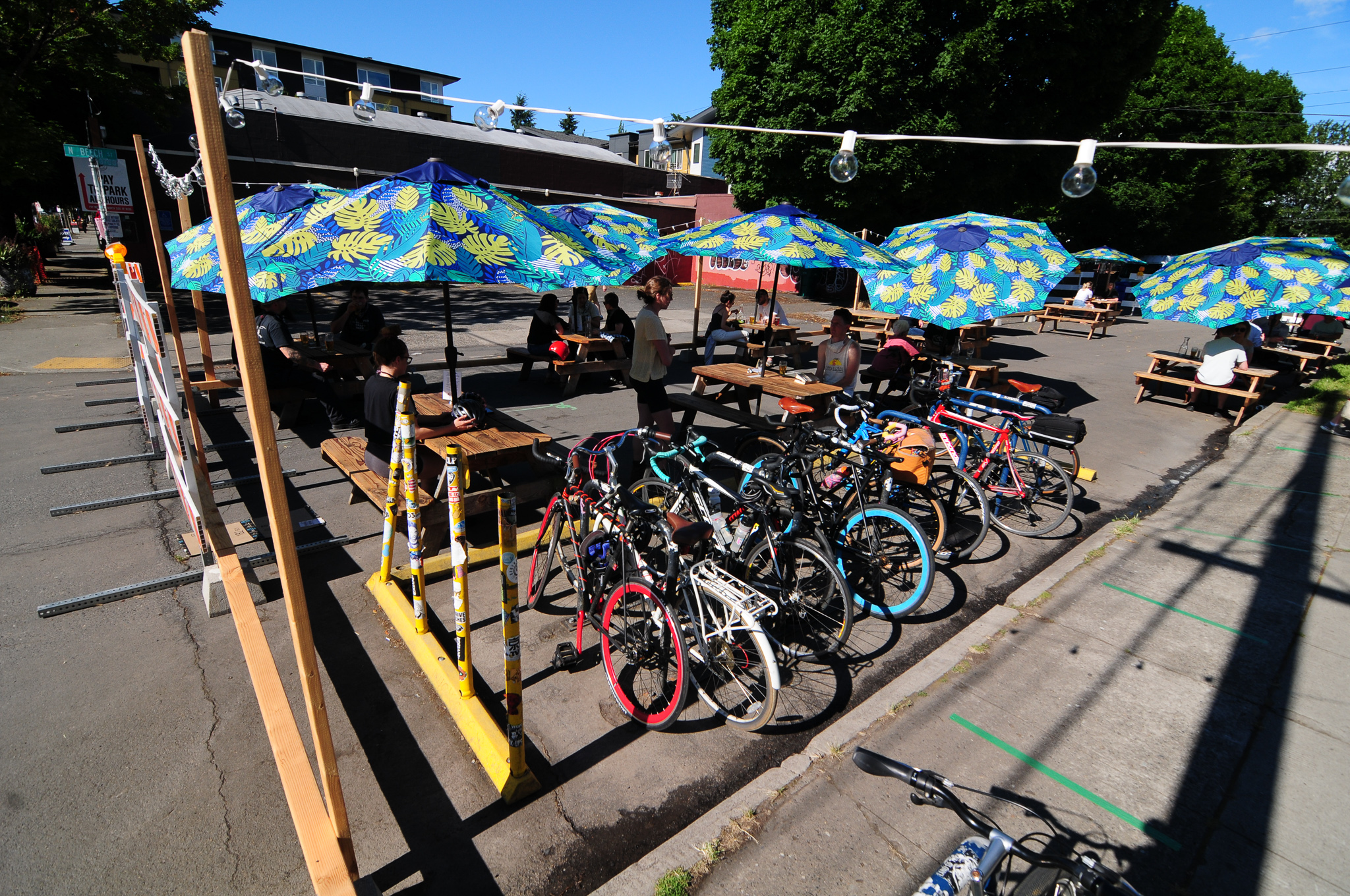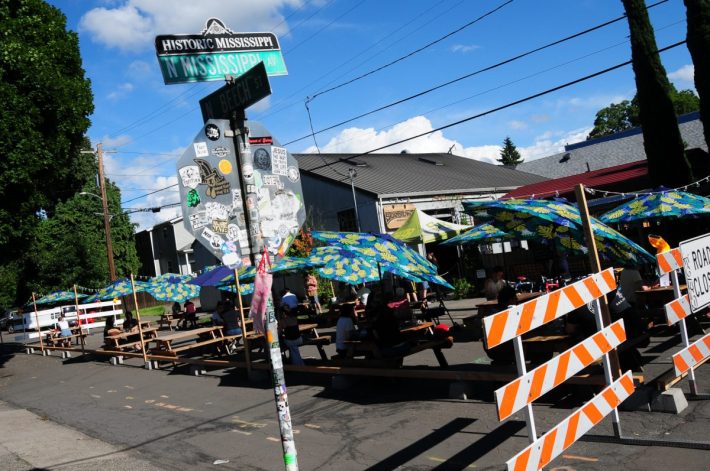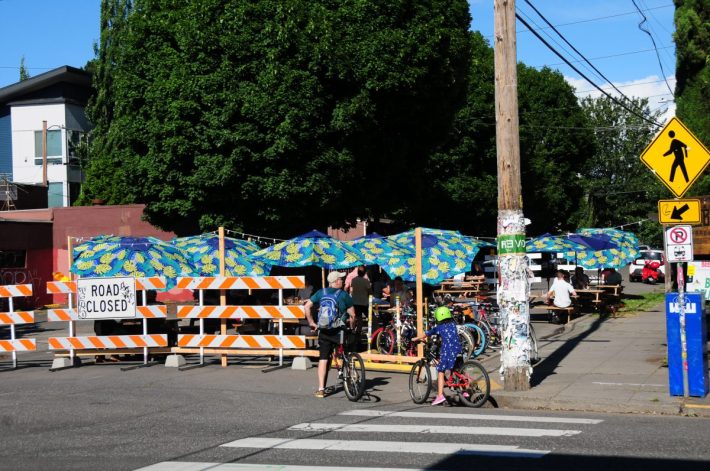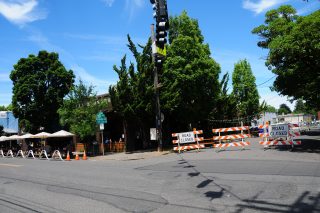For years local transportation reform activists have pushed City of Portland to go beyond car storage and driving and think more creatively about what we can do with our streets. And when calls for new uses of street space were made, it was often restaurant owners who lined up to say their business would perish without maximum access for car users.
Then a pandemic hit and relatively overnight we’ve seen the most robust transformation of public right-of-way in Portland’s history. I’m talking about the new Healthy Business permit program that launched last week.
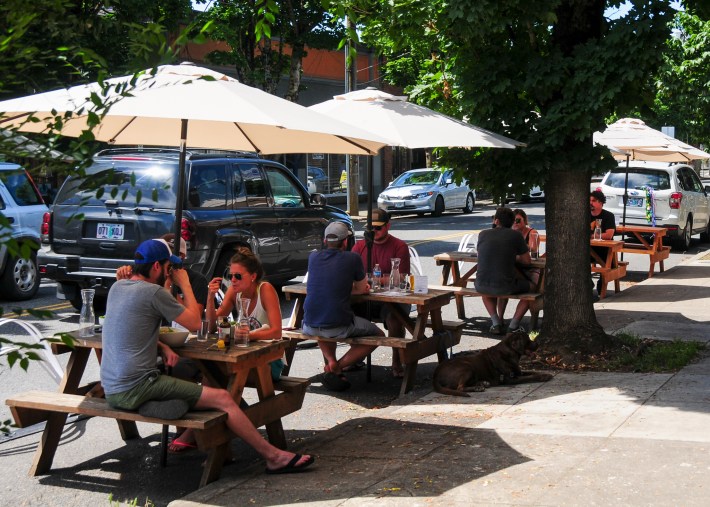
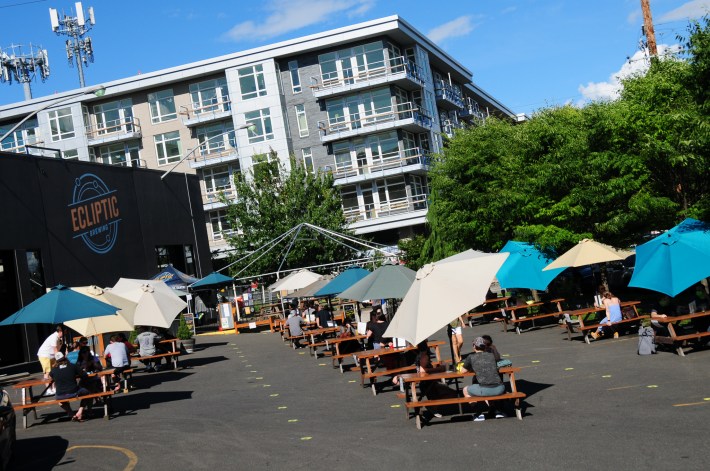
With nearly 200 permits issued so far, restaurant owners have wasted no time turning parking lots, parking spaces, and even streets into dining areas. A map of who’s received permits shows the program has been very popular with businesses along popular commercial corridors such as Lombard in St. Johns and Stark Street in Montavilla.
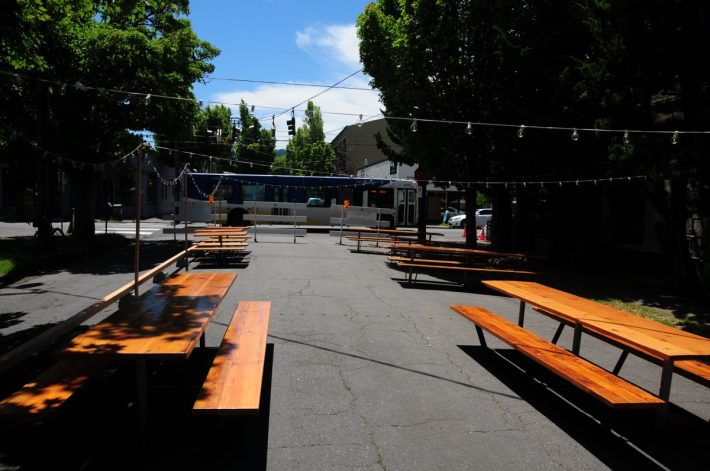
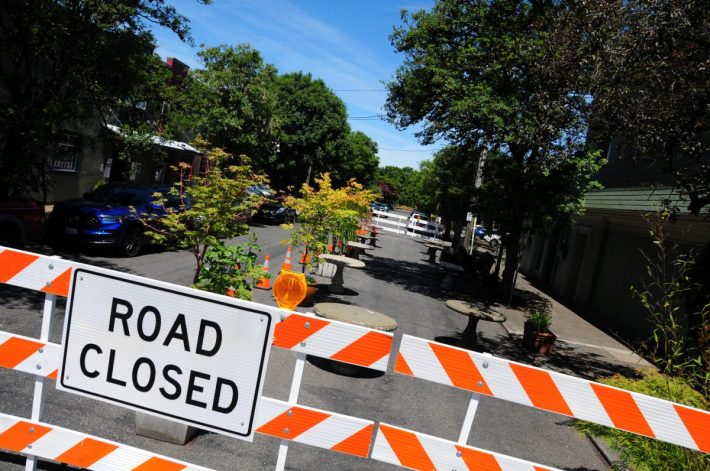
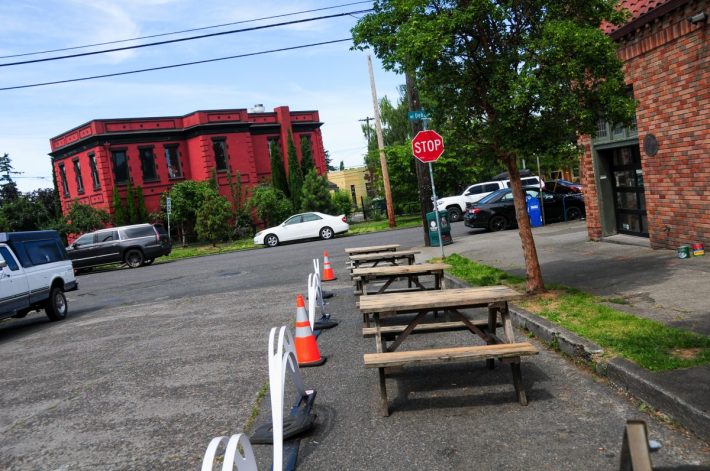
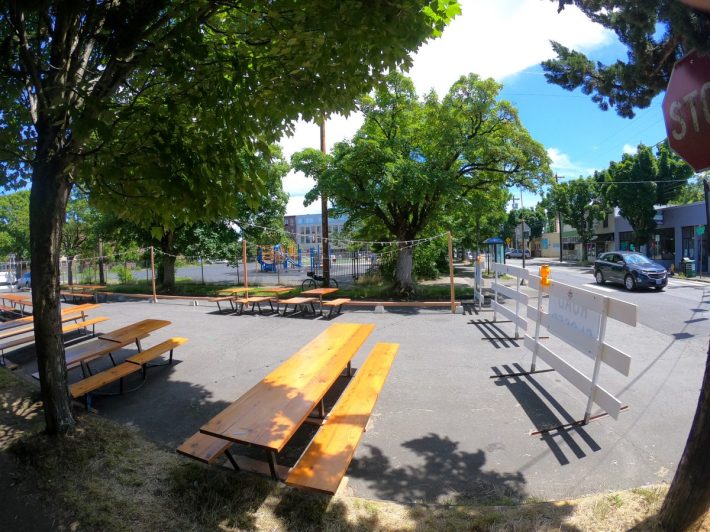
(Note: Photos taken during 90-degree temps in middle of the day. These spots were packed later in the evening!)
Judging from photos in news reports and crowds I’ve seen, the new seating arrangements have been popular with customers too. But as good as these street seats and plazas are for the local economy and comfort of patrons, the program has also raised concerns.
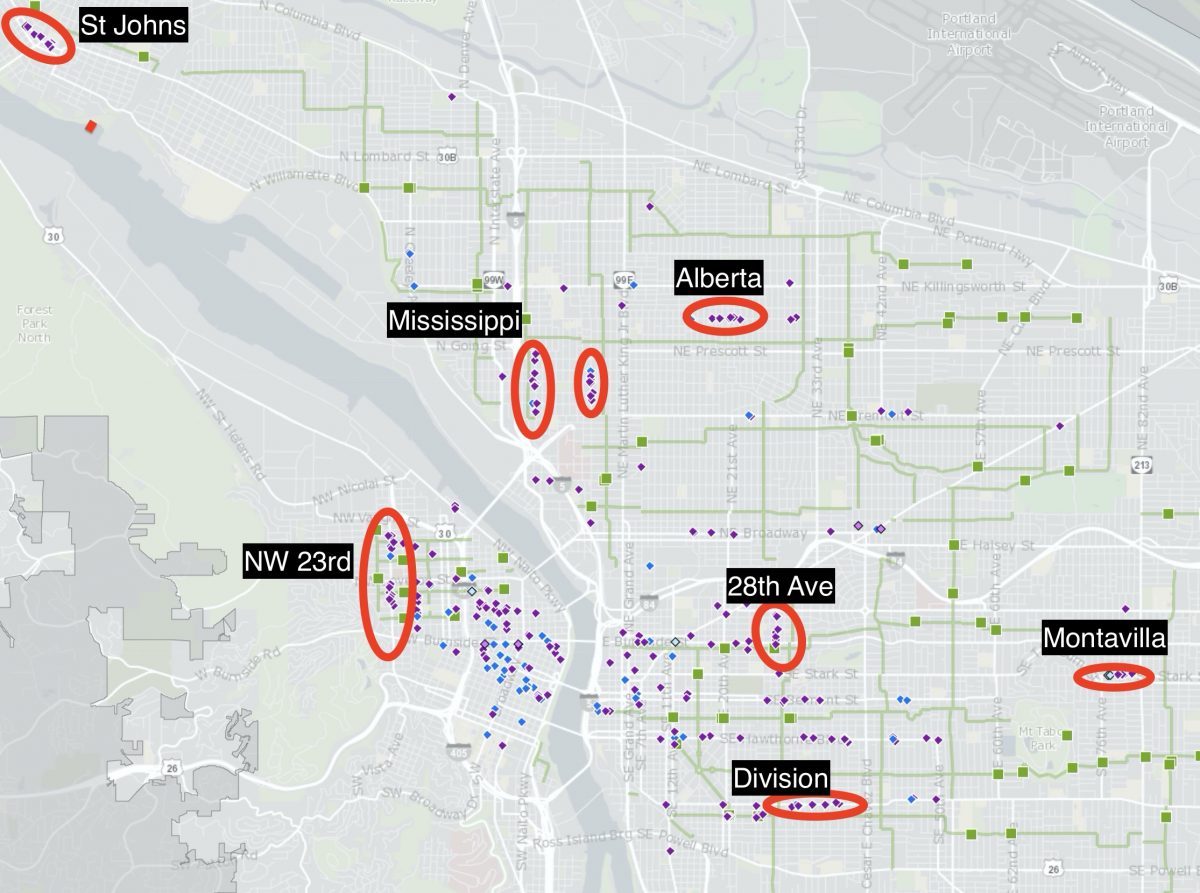
We’ve noticed worries about the geographic equity of the permits, the “privatization” of these spaces, and health concerns given the ongoing Covid-19 pandemic.
If you take a closer look at the official PBOT map of permit locations (above), you see big gaps. This is expected given Portland’s “streetcar suburbs” and the healthy business districts they’ve helped create. It’s also troubling from an equity and housing affordability perspective. Home prices in these areas have skyrocketed in the past decade, forcing many Portlanders into parts of the city where no permits have been issued. That means people with less money have to travel further to take advantage of these restaurant plazas. If they rely on transit they’ll have to take a health risk and contend with major TriMet service cuts due to the pandemic.
These new plazas also create a jarring juxtaposition of people using streets to down IPAs and hamburgers, while many Portlanders march on these same streets in an ongoing battle to end racism and police brutality. I’m reminded of the now famous viral tweet from Ziwe Fumudoh where she wrote: “there are two americas: one fights for black lives and the other fights for brunch” and shared an image of protestors next to young white people dining.
And who has access to these spaces? When PBOT created the Ankeny Alley plaza downtown many people grumbled that they handed too much control over the space to adjacent businesses — at the expense of the (non-paying customer) public. This time around, the street space is to remain public* (*nope, see update below) and PBOT requires a minimum 11-foot lane for through traffic at all times.
Then there’s the pandemic. Just as foot, bike and car traffic on our streets has increased in recent weeks, so too has the number of Covid-19 infections (and 43% of them are people of color).
Multnomah County Commissioner (and emergency room doctor) Sharon Meieran told the Willamette Week today that Portland is definitely not out of the woods with this virus. Not even close. “We have become tired of this disease, and we’re not even through the first wave. The disease is not tired of us,” she said.
Then there’s Jim Blackwood, a former senior policy director for the late City Commissioner Nick Fish. He wrote in an op-ed in the Tribune today that the plazas are “perilous” during the pandemic. While he’s conflating these PBOT-sanctioned plazas with the larger-scale plans being pushed by The Portland Promenade Project, Blackwood raises the point that public health will suffer because social distancing at them will be “erratic at best”.
One thing there’s no denying is that this program forces Portland to re-think how we use public streets. And for people who’ve dreamed of reducing access for car drivers, they’re an important step forward.
Have you seen or used any of these plazas? What was your experience? How can the city make this program last beyond the pandemic and create similar programs for uses beyond dining?
UPDATE, 3:52pm: PBOT has clarified a question we had about public access to these spaces. Here’s how PBOT Communications Director John Brady explains:
“The permit holder manages the spaces and makes the decisions about how it is used and who can use it. It’s not a public space in that sense.”
That feels like a problematic arrangement that could result in people being denied access to these spaces based on whether or not they are buying something and/or based on the whim and biases of a particular business owners. We’ll be monitoring the situation.
